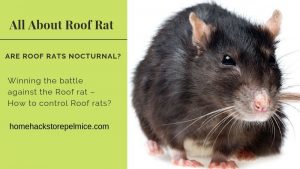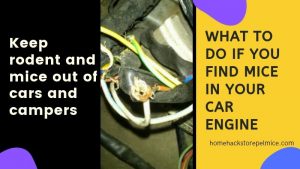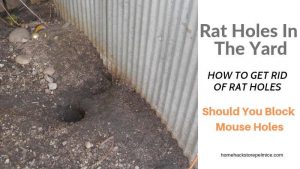The return of the winter paints a picture of snow lying on the ground, with temperatures below freezing point, and you cozily spending most of your time at home, wrapped in a blanket.
It also refers to the increasing population of furry fellas such as rats and mice seeking shelter from the cold. They usually head indoors at this time of the year, searching for food and might make your house their new residence.
Is your property prepared for these unexpected guests? By setting traps and taking rodent control measures, you can prepare your home for the onslaught.
Why are rodent issues such a typical occurrence in winter?
The arrival of winter signals cold temperatures leading to rodents’ invasions in homes as they scurry to find warmth. Houses provide insulation, heat radiating from room heaters, and safety, all so nice and comfortable for the rodents to create their nesting grounds inside the built-in tiny spaces and cavities inside the house.
The gaps between floors, within walls, attics, and inside substructure crawlspaces provide the much-needed protection to these furry scavengers from the cold and any external predators.
The heat from inside the living rooms reaches the tiny corners, the areas of their infestation, and gives them enough warmth to keep them breeding through the winter. Also, the dirt, debris, and grease left from the holiday parties easily attract these pests and make it difficult to track them down. They are excellent burrowers that can gnaw several meters deep into the walls and good climbers that can ‘shimmy’ up through the pipes and walls thus entering your homes.
Do mice and rats undergo hibernation?
No, they do not hibernate. It would have been so pleasant if they did, especially for homeowners who could spend their winters peacefully without worrying about them. Instead of going for a three-month dirt nap, like skunks and snakes, they find ways to stay active, well-fed, and multiply their progeny during the freezing winter. These can become problematic especially if they establish your house as their base of operations!
How do they get through the winter?
Most of the time, rats and mice built little nests to hide in and venture out only in the warmest time of the day, searching for food and return to their nests at night. Most of them nest in large numbers grouping together to conserve body heat. However, when it gets too cold and outdoors become too wet, they go looking for food and hiding spaces inside a human abode.
Just when you are feeling like comfortably settling inside the warmth of your home, a horde of them might also be stacking up in the corners. Different species of rats have distinct nesting patterns. However, all are quite similar to abandon their rough livelihood for a life inside the cozy human den.
Rats and Mice and the damage that they cause
CONTAMINATION – These rodents eat a lot. They eat and destroy as much food as to feed 200 million people in a year. In doing so, they leave droppings and germs and saliva frequently, which attracts pathogens to spread. Airborne germs are also a nuisance. Simply sweeping or cleaning these droppings can give rise to Hantavirus, salmonella, Lymphocytic Choriomeningitis, Leptospirosis, and other bacterial diseases.
DAMAGE DONE TO BUILDING SYSTEMS – Mice, rats, and other larger rodents have incisors that are perfect for gnawing deep. These catastrophic animals live inside of holes and chew their way through insulated ducts and gather twigs and dirt to build nests inside the air conditioning units. These badly affect the efficiency of the appliance and even cause permanent damage to it. Inhaling the air from that AC can also expose the owners to dangerous germs.
ELECTRICAL DAMAGE – These contagious animals love to chew on pipes, wires, and pretty much on anything. Since their teeth never stop growing, through their entire lifetime, they go on nibbling continuously. Repairing electrical damages should be prioritized immediately because if it is not, then the consequences can be life-threatening. When mice, squirrels, and rats chomp off the protective insulation, the naked wires can spark and pose a fire hazard.
These rodents can chew their way through the electrical panels that can cause severe damage to the entire electrical system running your home.
STRUCTURAL DAMAGE – Built with incisors, building materials such as furniture, sheetrock, or wood is no match for these determined rodents. They can easily make holes through anywhere, be it roofs, crawl spaces, or ground areas for their nesting purposes. Once they are inside any building, they will continue to wreak havoc to the entire property and can even tear it down completely. Plus through such structural damages, water can easily seep through the roofs, causing dampening of the walls that lead to even further wreckage.
HARMFUL & PUNGENT ODORS – Rodent infestations lead to stinky odors and acute health concerns. The unpleasant smells can aggravate allergies, asthma, and even exaggerate any existing respiratory problems. Rodents often get stuck and die within confined places, often in difficult to reach areas that can further complicate the odor issues. In those cases, fumigation is done to remove the cause of the problem effectively.
Hiding Places for Mice & Rats in your home during winter
- Roof, including the eaves, gables, and rafters
- Openings in the attic where insulation is not sheltering the attic from outside
- Cracks, holes, and gaps in your entire building and of course inside of your house
- Inside Ducts and holes, created for electrical cables, plumbing, etc
- Back of kitchen sink and toilets
- Inside Cabinets and Pantry
- Vents especially in Air conditioners and crawlspace
- Openings in elevator shafts
Ways to Keep the Rats and Mice Away
Seal up any holes or Gaps – Do an exhaustive inspection and seal up the holes that are larger than a dime.
- You can fill the gaps with Copper or Steel wool
- You can apply cement, caulk, or Spackle on top
- You can also take professional help to inspect the building and a plumber to check the pipes
Clean your house every day – Rats always look for dirt and leftover food crumbs. Henceforth, it is a necessity to keep the house spic and span clean so that they do not find any places to hide their food. You can follow some of the practices mentioned below:
- Wash all of the dirty dishes as soon as you have finished eating
- Clean your trash can regularly, especially if there is leftover food
- Wash up any drink or food spills without any delay
- Throw away old papers, cardboard boxes, or piles of old clothes to prevent their nesting activities
Store your trash inside sealed garbage cans – Trash cans placed both indoors and outdoors and should be secure to prevent attracting rodents. A snugly fitting lid will prevent mice and rats from getting inside.
Keep the non-refrigerated food in sturdy metal or glass containers – These needs to be done as rats can easily chew through thin plastic and cardboard material. You can easily buy the metal and plastic containers from kitchen stores, grocery stores or online.
Employ natural remedies for extra protection – Now these options might not give you the complete protection that you are expecting, but combined with a secure waste management plan and a clean house, they provide a slight assist to fight against these pesky animals. You can:
- Keep cotton balls soaked in peppermint oil for a few minutes and keep them in openings and drawers.
- Put mothballs in shelves and drawers storing your clothes to keep rodents from damaging your garments
- Crush pepper and sprinkle them in openings and holes.
- Spread cat litter in rat prone zones such as in basements and attics.
Call professional help before the problem gets out of hand – If the situation gets beyond your control, it is always advisable to call in the professional rodent extermination services. They have a way of identifying the rat type and the best ways to get rid of them. They will also help to find out the source of infestation if it is dirt, food waste, cracks or holes, overgrown vegetation, etc.
Methods to prevent rodents from damaging Electrical Wires
Concrete – There are very few animals that can gnaw their way against concrete. Hence, it is highly recommended to cover electrical cables in wet concrete while building. Wrapping them in a thin layer of concrete will also do the trick. Take the wire and place it in a designated position covering it with a thin layer of concrete.
Steel Pipe – Rodents cannot gnaw on steel pipes. Employing steel pipes to mask the wires can be a brilliant idea, especially for the cables that run for long distances. Steel does not rot and rust and, therefore, can be put inside the ground if needed.
Plastic Pipes – This is the most commonly used method in which electrical wires are made to run through the inside of plastic pipes. Mice and rats are unable to gnaw their way through plastic, thus ensuring the security of your wires. The tubes can also be buried underground when they run for more than a few meters.
Conclusion
In conclusion, be vigilant, as these unwelcome guests do not hibernate during the winter, and hence, neither should you. These animals are not to be taken lightly, but with knowledge and exhaustive preventive measures, they can be easily taken care of because Prevention is always better than cure, isn’t it?




